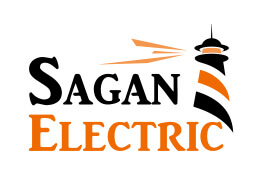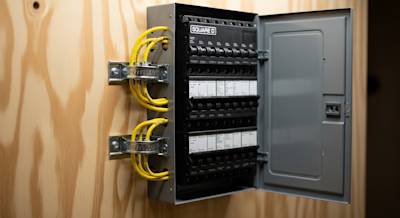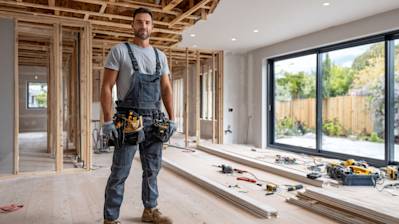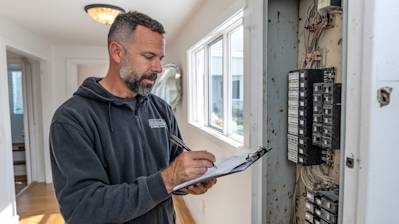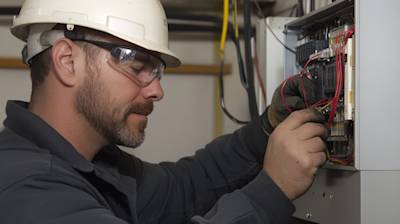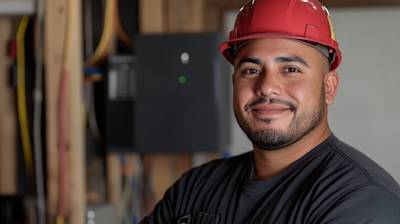Any electrician can power up a structure with plenty of time and tools. They continue to claim this until you show them the plans for a workplace or multi-story complex.
There is a plethora of similarities between commercial and residential electrical contractors, who both work on difficult and significant projects. Commercial electrical contractors frequently work on complex projects, but they also frequently work on residential projects, so they usually have a complete understanding of home demands.
There are many different types of electricians because specialization is essential given the complexity of the electrical industry. At Sagan Electric, we have a team of both commercial and residential electrical contractors. We also have different types of electricians to suit all types of electrical projects.
Different Types of Electricians
Depending on their area of expertise, education, and experience, there are over 20 different types of electricians.
Five of the common different types of electricians are listed as follows:
- Residential electrical contractors
- Commercial electrical contractors
- Industrial electrical contractors
- Automotive electrical contractors
- Low voltage specialists
Although not all electricians work as contractors, the majority of residential and commercial electricians do. This enables them to take on tasks alone or as a contractor. The five main distinctions between commercial and residential electrical contractors are combined by the experts at Sagan Electric and listed below:
Differences between Commercial and Residential Electrical Contractors
Services Offered by Commercial vs. Residential Electrical Contractors
Domestic electricians or residential electrical contractors are in charge of the completion, adherence, and safety of household electrical installations.
The following are additional duties for residential electrical contractors:
- Analyzing technical specifications
- Repair and service of electrical fixtures and appliances
- Identifying and fixing electrical problems
- Electrical system testing and rewiring for residential buildings
Similar operations are carried out on a bigger, more complex scale by commercial electrical contractors, who also set wire systems, machinery, and control panels in accordance with the approved designs.
Among several other places, they can be found in commercial buildings, working places, government spaces, and industrial complexes. They typically take care of electrical permits frequently needed in big cities.
Technical Knowledge Necessary
Electrical technicians begin their schooling and training in the same area, whether they work in homes or businesses. Although they may have studied in technical colleges, worked as trainees, or had undergrad degrees, all electricians share the same fundamental skills.
Commercial electrical contractors need additional experience because of variables affecting complexity, dependability, and safety. An in-depth understanding of subjects, including phase structure, control mechanisms, and power and phase balancing, is required, as well as more than 4,000 hours of work experience.
The proficiency and certification requirements for electricians vary by state. Some states even permit homeowners to do their own electrical cables!
Regulations, Compliance, and Standards
There are many electrical compliance requirements for different types of electricians. Everything is governed by the requirements for residential electrical conformity, including the wires, insulation, and connections that must be utilized.
Standard and regulation requirements for commercial electrical contractors are even stricter. They conform to personal safety regulations, electrical components safety regulations, and insurance coverage levels for potential electrical catastrophes.
The kind of certificates used vary greatly, and electrical contractors are typically licensed at the state or municipal levels. But almost all states only grant licenses for electrical contractors to people who have earned their Master Electrician certification or to companies that employ a Master Electrician.
Supplies and Equipment
Power supply types are a key distinction between residential and commercial power supplies. Typically, residential electrical contractors work with single setups that have voltages between 120V and 240V.
Because of the high power needs of commercial and industrial electrical loads, commercial electricity is three-phase, with conductors carrying voltages ranging from 120V to 480V.
The materials and equipment utilized must be altered due to the power difference. Electrical systems for homes need thin gauge wiring with little shielding and covering. Different kinds of wiring, switches and other electrical sources are utilized depending on whether the gear runs on 120V or 240V.
The commercial electrical system needs cables with additional insulation and sheathing to manage demanding industrial applications. Higher current and voltage flow, which are anticipated to operate nearly continuously, can be examples of these.
Commercial electrical systems are made to be more available in the event of a breakdown in addition to meeting load and safety requirements. Commercial systems frequently fail and need more maintenance, hence the majority of them are located in locations with simple navigation and access panels for diagnosis. Service maintenance agreements are extremely advantageous for commercial electrical contractors.
Residential vs. Commercial Project Size
Electrical projects for businesses are generally larger than those for homes. These projects, which range from office buildings to shopping centers and other complexes, demand a lot of labor, time, and expertise to execute.
Commercial electrical contractors don't have to limit themselves to working on big businesses. Large residential projects, such as mansions and estates, as well as apartment complexes, which might have systems as complex as those of commercial projects, are frequently exempt from these rules.
The contrary isn't always true, but normally commercial electrical contractors can accept any project that a home contractor can. As a result, they have access to a larger work market, which helps them even in these peculiar circumstances for contractors brought on by the pandemic.
Can Residential Electrical Contractors Become Commercial Electrical Contractors?
By completing certification criteria, certain skilled and certified home electrical contractors can become commercial electrical contractors. If you are currently a licensed home electrician, you can choose from the following:
- Successfully completed the necessary Master Electrician certification test.
- Take one (or all) of the national certification exams to increase your ability to work on commercial projects.
- Although a bachelor's degree is not required, it will improve your work prospects because 10% of commercial electricians hold one.
- Practice for around four years under a Master Electrician, accumulating 2,000 hours. The school can offset 144 hours per year but verify your local laws.
Whether you require the services of commercial electrical contractors or residential electrical contractors, Sagan Electric has got you covered. At Sagan Electric, we offer a range of electrical services throughout the region to accommodate all your needs because we have different types of electricians on board.
Contact Sagan Electric today to get more details!
Tags: commercial electrician , residential electrician , electrical contractor,
